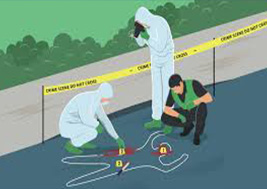Forensic Engineering
Forensic engineering is primarily concerned with the link between engineering at law, whether civil or criminal. The purpose of an investigation will usually be to discover the cause of failure in a particular material, component, product or structure, and determine whether this failure was accidental or intentional. Whilst accidental failures may be the result of a natural cause, such as corrosion or fatigue, they may also include car, rail and aviation accidents. Engineering disasters, such as the collapse of a commercial bridge, will often be subject to such an investigation. However certain failures could prove criminal intent, whether maliciously or through negligence, and will often result in court proceedings
This subject is applied most commonly in civil laws, but it may be of great use in criminal laws as well. The task of a Forensic Engineer is to collect the evidences and the other related facts, determine the cause that may have led to the destruction and lastly, yet one of the most important is to assist the court in proper findings related to the accident for a justified trial.
Forensic Engineering basically deals with the investigation of products, materials, structures and components that either fail or function inappropriately causing huge loss to person(s) and property. This subject is applied most commonly in civil laws, but it may be of great use in criminal laws as well
Other than, vehicles and machines, any case involving the accidental collapse of bridge, railway track, huge buildings or any such infrastructure are to be considered under this science. Just like any other Forensic-related branch, a sequential order of investigating and collecting data linked to the products, components, materials and structures is of great help in aiding and resolving cases pertaining to Forensic Engineering.










.jpg)





















